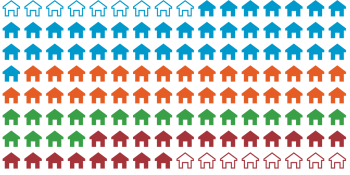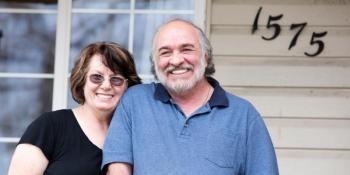In 2019, Habitat for Humanity launched Cost of Home, a five-year advocacy campaign centered around influencing policies and systems change with the goal of supporting access to affordable homes for millions of people living in the U.S.
With over 300 policy successes in the first four years, Habitat funded the Urban Institute to investigate how Cost of Home delivered change to local and state Habitat organizations, other local advocates, stakeholders and community residents. We hope the takeaways from this investigation, strategies for housing advocates to effect policy change, will support our peers and housing advocates around the country to campaign for policy reform.
To reach takeaways, Urban conducted interviews with stakeholders covering seven different policies that were supported directly or indirectly by Cost of Home. During these interviews, Urban asked participants to provide background on the policy in question, including details on how the specific policy need was identified, the process of getting the policy passed or approved, and describing Habitat’s role in the policy’s passing. Urban also asked interviewees to share observed or expected impact for the policy or initiative on their jurisdictions’ residents.
The seven policies are organized by policy focus area below.
Increasing supply and preservation of affordable homes
1. Asheville, North Carolina
The Affordable Housing Bond and Family Friendly Affordable Buncombe Campaign in Asheville, North Carolina, aim to increase the availability of affordable housing and provide support to homeowners.
By providing funding resources for affordable housing development and homeownership, these initiatives have increased the county’s contribution towards expanding the supply of affordable rental units.
2. Cincinnati, Ohio
In partnership with the Lower Price Hill Neighborhood and with funding from the City of Cincinnati, Habitat for Humanity of Greater Cincinnati committed to creating seven homes and to raise the level of homeownership in Lower Price Hill.
Habitat for Humanity of Greater Cincinnati also advocated for $1 million from city funds to support a partner organization to rehab 46 apartment units in the neighborhood.
3. Colorado
The passing of Proposition 123, a statewide initiative to have direct funding for affordable housing in Colorado, created the opportunity for municipalities across the state to increase their affordable housing stock by 3%.
Equitably increasing access to credit
4. Indiana
Habitat for Humanity of Indiana continuously participates in efforts against aggressive payday lending in the state, in response to attempted expansions made by some members of the legislatures.
In partnership with coalitions, nonprofit organizations and various stakeholders, Habitat of Indiana is vigorously advocating for the establishment of a 36% flat rate as the lending standard. This advocacy aims to enable homeowners to access loans without facing exorbitant interest rates that often lead borrowers into aggressive repayment plans or refinancing installment loans.
Optimizing land use for affordable homes
5. Charlotte, North Carolina
The 2040 Comprehensive Plan and adaptation of the Unified Development Ordinance in Charlotte, North Carolina, legalized duplexes and triplexes in areas that previously only allowed for single-family exclusive-zoning, with the purpose of adding density and available units to the community.
Ensuring access to and development of communities of opportunity
6. Wichita, Kansas
The passage of House Bill 2317 in Wichita, Kansas, successfully ensured that community members receive advance notification of plans to upgrade or install utility poles.
This development came after Habitat for Humanity of Wichita raised concerns about the sudden and uncommunicated installation of power poles in a neighborhood where they had constructed 35 homes.
7. Pittsfield, Massachusetts
The advocacy and establishment of the At-Home in Pittsfield program in Pittsfield, Massachusetts, led to the successful exterior renovation of dozens of homes with funding from local lenders and city funds. Central Berkshire Habitat for Humanity successfully advocated for the allocation of $500,000 per year to the At-Home Program since 2020.
Stakeholders interviewed included a total of 11 staff members of seven different Habitat affiliate organizations: Charlotte, N.C.; Greater Cincinnati, Ohio; Metro Denver, Colo.; Wichita, Kan.; Indiana; Central Berkshire, Mass., and; Asheville, N.C. Urban also interviewed the Buncombe County Commissioner Chairman, a member of a nonprofit sustainability organization in Charlotte, and homeowners.


